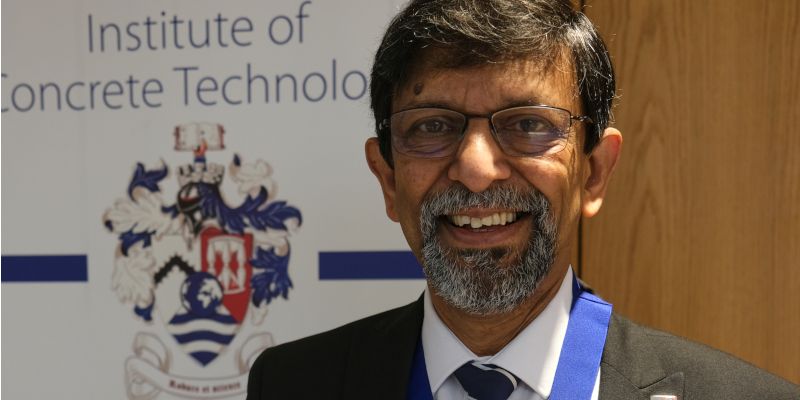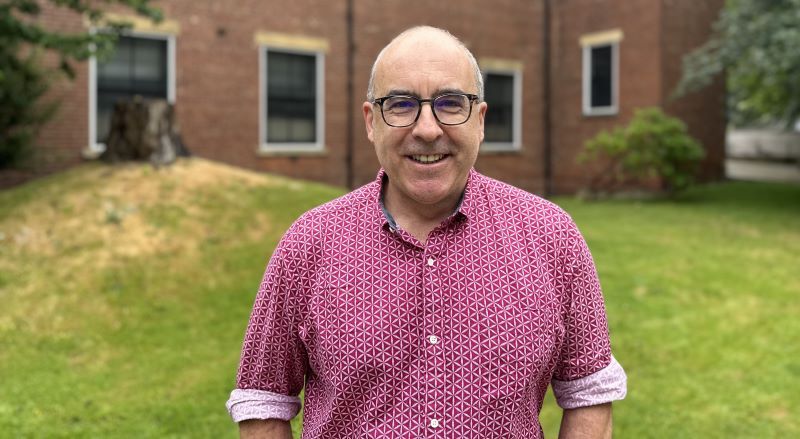
A civil engineer who has conducted pioneering research into the performance and durability of concrete has been recognised in the King's Birthday Honours.
Professor Muhammed Basheer, Chair in Structural Engineering at the University of Leeds, has been named a Commander of the Order of the British Empire (CBE) for services to civil engineering.
The King's Birthday Honours mark the achievements and service of extraordinary people across the UK.
Professor Basheer’s career as an educator and researcher in civil engineering spans more than four decades, including a period as Head of the School of Civil Engineering at Leeds.
His research on non-destructive tests and structural health monitoring led to the establishment of two University of Leeds spin-out companies, Amphora Non-Destructive Testing and Sengenia. Amphora NDT products were used to assess the concrete elements of the Bird’s Nest Stadium, the centrepiece of the 2008 Beijing Olympic Games.
Professor Basheer is also a Fellow of the Royal Academy of Engineering - the UK’s national academy of engineering - and the Irish Academy of Engineering, which gives independent advice to policy makers on engineering and technology. He has also received a Lifetime Achievement Award from the Civil Engineering Research Association of Ireland.
He is immediate past President of the Institute of Concrete Technology and a visiting professor at University of Jinan and Chongqing University, China.
Professor Basheer said: “My work in concrete technology and leadership in civil engineering have brought me into contact with some inspirational and innovative students, academics and senior industry figures.
“These relationships have enabled me to become an ambassador for the University and forge collaborations around the world. My hope is that this tremendous honour will enable me to further develop such partnerships.”

Professor Steve Jackson, biochemist and biotech entrepreneur, has been knighted. Professor Jackson is University of Cambridge Frederick James Quick Professor of Biology and a Senior Group Leader at the Cancer Research UK Cambridge Institute.
He graduated from the University of Leeds with a Bachelor of Science degree in Biochemistry in 1983.
Professor Jackson has identified key principles by which cells respond to and repair DNA damage and helped define how their dysfunction yields cancer and other age-related diseases. He founded three biotech companies including KuDOS Pharmaceuticals, which was acquired by AstraZeneca. Several KuDOS-derived drugs are in clinical trials, with the most advanced, the “blockbuster drug” PARP inhibitor olaparib/LynparzaTM being a marketed drug worldwide for ovarian, breast, pancreatic and prostate cancers.
Speaking on a visit to the University of Leeds in the week that his honour was announced, Professor Jackson said: “It’s extremely interesting timing to come full circle. It was really in Leeds in the early 1980s that I learned the real nitty gritty details of genetics, chemistry, biochemistry and biology. It’s those principles that have basically provided the grounding for my academic career ever since.
“I hope this honour is a way of indicating that the country recognises that innovation can stem from fundamental academic science. We do a good job of this in the UK. And we have the companies and infrastructure to get these ideas over the line.”
Military historian Dr Peter Liddle has been made an OBE for services to heritage and public understanding of the world wars.
Dr Liddle achieved a PHD in History from the University of Leeds and later founded the University’s Liddle Collection, which documents and preserves first-hand accounts of individuals who experienced the two World Wars. It was established as part of the University’s Special Collections in 1988.
He is also patron of the Halifax Great War Heritage Society and life president of the Second World War Experience Centre.
Tim Procter, Collections and Access Manager, Special Collections and Galleries, at the University of Leeds, said: “Peter Liddle began collecting the reminiscences and archives of men and women involved in the First World War, and publishing works drawing on their experiences, long before any large-scale consideration of legacies or anniversaries had entered the wider public conscious.
“His unique collection held at the University of Leeds today allows anyone to gain insight and first-hand accounts of how the war touched all manner of people, from soldiers in the trenches to women ambulance drivers, from the Far East to the domestic front.”
Richard Mantle, who was awarded an honorary Doctor of Music by the University in 2009, has been named a Knight of the Thistle for services to opera. Sir Richard is general director of Opera North. He was awarded an OBE in 2013 for services to music.
Leicestershire Army officer Major Hamish Davison, Royal Tank Regiment (RTR), who studied architectural engineering at the University of Leeds, has been named an MBE.
Major Davison's leadership was pivotal to the successful delivery of the State Funeral for Her Majesty The Queen. His award recognises his work leading the Counter Terrorism and UK Operations Team.
Dr Susan Pope, a forensic scientist, has been awarded an OBE for services to forensic science and the criminal justice system. Dr Pope achieved a PhD in Biological Sciences from the University of Leeds.
Scout leader Alan Naylor has been awarded the honour of Medallist of the Order of the British Empire (BEM) in recognition for his service to young people. Mr Naylor studied geography at the University of Leeds.
Professor Simone Buitendijk, Vice-Chancellor and President of the University of Leeds, said: “Higher education has a vital role to play in tackling the world’s most pressing issues, pushing the boundaries of knowledge and working collaboratively to help provide solutions.
“These King’s Birthday Honours are richly deserved and demonstrate the world-leading research taking place at the University. I would like to offer my congratulations to each of our colleagues who have been acknowledged today for their remarkable contributions.”